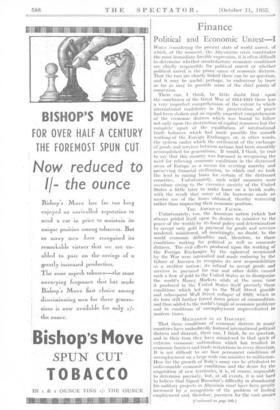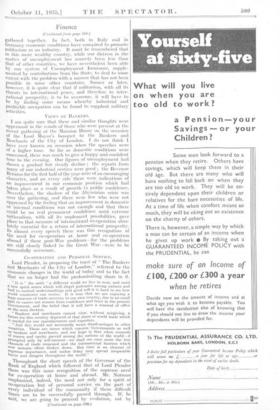Finance
Political and Economic _Unrest—i
WIIEN considering the present state of world unrest, of which, at the moment, the Abyssinian crisis constitutes the most immediate forcible expression, it is often difficult to determine whether unsatisfactory economic conditions Are chiefly responsible for political unrest or whether political • unrest is the prime cause of economic distresg. That the two are closely linked there can be no question, and it may be useful, perhaps, to endeaVour• to trace as far as may be possible some of the chief points Of connexion.
There can, I think, be little doubt that upon the conclusion of the Great War of 1914-1918 there was a very imperfect comprehension of the extent to which international confidence in the preservation of peace had been shaken and an equally imperfect comprehension of the economic distress which was bound to follow not only upon the destruction of capital resources but the complete upset of the equilibrium of international trade balances which had made possible the smooth working of the Foreign Exchanges, or, in other words, the system under which the settlement of the exchange, of goods and services between nations had been smoothly accomplished for generations. It would, I think, be true to gay that this country was foremost in recognising the need for relieving economic conditions in the distressed areas of Europe as a means for averting anarchy and preserving financial civilisation, to which end we took the lead in raising loans for certain of the distressed countries. Unfortunately, such relief measures •were overdone owing to the excessive anxiety of the United States a little later to make loans on a lavish scale, with the result that many of the borrowers made an , unwise use of the loans obtained, thereby worsening rather than improving .their economic position.
Tun AMERICAN FACTOR. Unfortunately, too, the American nation (which has always prided itself upon its desires to minister to the peace of the world) by its fiscal Policy and determination to accept only gold in payment for goods and services rendered, Ministered, all Unwittingly, no doubt, to the world economic difficulties and, therefore, to those conditions making for political as well as economic distress. • The evil effects produced-upon the working of the Foreign Exchanges by the upheaval occasioned by the War were intensified and made enduring by the failure of America to recognise its new responsibilities as a creditor nation; its refusal to accept goods and services in payment for war and other debts caused such a flow of gold to the United States as to disorganise the world's Money Markets while at the same time it produced in the United States itself precisely those conditions which led up to the Wall Street gamble :Ind subsequent Wall Street collapse of 1929, which in i I s turn still further forced down prices of commodities, :111(1 thus added to the World's tangleof economic problems and to conditions of unemPloyment unprecedented in modern times.
MILITARISM AS AN INDUSTRY. That these, conditions of economic distress , in many countries have undoubtedly fostered international political distress and distrust, there can, I think, be no question, and in their turn they, have ministered to that spirit of extreme. economic nationalism which has resulted in economic barriers.and trade restrictions in every direction. It-is not difficult to see how permanent conditions of unemployment on a large scale can minister to militarism. How far the growth of Italy's army can be attributed to Unfavourable economic conditions and the desire for the acquisition of new territories, it is, of course, impossible to determine precisely, but, at all events, it is not hard to believe that Signor Mussolini's difficulty in abandoning his military projects in Abyssinia must have been greatly increased by a recognition of the problem of finding employment and, therefore, payment for -the vast armies (Continued on page 589.) •
Finance
(Continued from page 588.)
gathered together. In fact, both in Italy and in Germany economic conditions have conspired to promote militarism as an industry. It must be remembered that in this more wealthy country, while our distress in the Matter of unemployment has scarcely been less than that of other countries, we have nevertheless been able by our system of Unemployment. Insurance, supple- mented by contributions froM the State, to deal to some extent with the problem with a success that has not been possible in some other countries. Sooner or later, however, it is quite clear that if militarism, with all its threats to international peace, and therefore to inter- national prosperity, is to be overcome, it will have to he by finding some means whereby industrial and profitable occupation can be found to supplant, military activities.
• VIEWS OF BANKERS.
• I am quite sure that these and similar thoughts were Uppermost in the minds of those who were present at the recent gathering at the Mansion House on the occasion of the Lord Mayor's banquet to the Bankers and Merchants of the City of London. I do not think I have ever known an occasion when the speeches were Of a higher tone. So far as domestic conditions were concerned, there was much to give a happy and confident tone to the evening. Our figures of unemployment had shown a gradual but steady decline ; the reports from Many of our industrial centres were good ; the Revenue Returns for the first half of the year were of an encouraging Character, and on every side there were indications of an improvement in our economic position which had taken place as a result of growth public confidence. • Nevertheless, the shadow of the Abyssinian crisis was 9ver the gathering, and there were few who were not oppressed by the 'feeling that an improvement in domestic Or internal conditions was not enough and that there could be no real permanent confidence until extreme nationalism, with all its unpleasant possibilities, gave Place to that measure of international co-operation abso- lutely essential for a return of international prosperity. Iii almost , every speech there was , this recognition of the need for co-operation at home and co-operation abroad if these post-War problems—for the problems are still. closely linked to the Great War—were to be successfully overcome.
CO-OPERATION AND PERSONAL SERVICE, Lord Pleader, in proposing the toast of " The Bankers and Merchants of the City of London," referred to the s• economic changes in the world of today and to the fact that we no longer had the predominating share in it.
It is 7 (he said) " a different world we live in now, and until whew spirit arises which will dispel jealousies among nations and lead to mutual understandings and good will it is hard to see how World commerce can revive. It is true that we are enjoying a large measure of trade recovery in our own country, due in no small Part to causes not remote from confidence and trust in the present Clovernment, and the belief that it will have a renewal of office at the next election. "Bankers and merchants cannot view, without misgiving, a future for this country deprived of that share of world trade which 4 needed for our manufacturers and exporters. "And this would not necessarily moan disadvantages to other eeuntries. These are issues which concern Governments as well N3 'bankers and merchants, and our hope is that when counsels of reason and sanity prevail among the nations of the world—if prompted only by self-interest—we shall see once more the free ellannels of trade reopened and the international barriers which now restrain -effort broken down. But time is an element of 8,11Preme importance, and undue 'delay may spread irreparable eaVoe and dangers throughout the world." .
Throughout the short speech of the Governor of the sank of England which followed that of Lord Plender there was this same recognition of the supreme, need for co-operation at home and abroad. Mr. Norman ehlphasised, indeed, the need not only for a spirit of e9-operation but of personal service on the part of every individual of the community if these difficult tunes are to be successfully passed through. If he Stud, we are going to proceed by evolution, not by
(Continued on page 590.)
Finance
(Continued from page 589.) revolution, we have continually to adapt ourselves to changing conditions, and this needs imagination, a certain amount of give-and-take, a willingness to wait and a certain degree of unselfishness.
































































 Previous page
Previous page